
Blame or be healed!
admin
- 0
Guilt rejects the idea that God has a hand in ALL things that belong to you It also exempts you from personal examination and cleansing of impure motives. Both are necessary to conform to Christ. If we do not accept all things as allowed by God and do not allow the Holy Spirit to guide us through self-examination and touch us in pain, then we cannot conform to God. God’s will is that we conform to his image. Also, may we be sanctified (cleansed). Romans 8:29 and Hebrews 2:11 make this clear.
“For those whom he knew beforehand [of whom He was aware and loved beforehand]He also intended from the beginning [foreordaining them] be molded in the image of his Son [and share inwardly His likeness]so that He may become the firstborn among many brothers.” (Amplified Version)
“For he who sanctifies and those who are sanctified are all of one; for which reason he is not ashamed to call them brothers,…”
The reason we were spared the penalty of sin is so that we would have the freedom to participate with God. We do this by obeying God’s Will and His Word. When we obey, we conform to Christ. Freedom is given. Obedience is a choice. The Bible teaches that suffering is one of the ways God used to teach Jesus obedience. Guilt postpones obedience. His belly oozes with the pus of self-protection. Continued disobedience develops rebellion. Rebellion against God compromises our ability to form healthy relationships. 1 John 1:7 suggests,
“but if we [really] they are living and walking in the Light, as He [Himself] is in the Light, we have [true, unbroken] communion with one another, and the blood of Jesus Christ His Son cleanses (takes away) us from all sin and guilt [keeps us cleansed from sin in all its forms and manifestations].” (Extended version)
Guilt prevents healing
But another thing that makes guilt impractical for the Christian bent on conforming to Christ is that it prevents healing. When we get hurt and hurt, we need to be healed. This is as true spiritually, mentally, and emotionally as it is physically. Suffering is the recognition that there has been a break between something that was intact and whole. We feel this break like a wound. The Hebrew word for wound means “to split,” or to divide into two distinct parts. It implies that something that was once intact is divided. Anything divided cannot hold weight. Jesus stated this in Matthew 12:25.
“…Every kingdom divided against itself is laid waste, and every city or house divided against itself will not stand.”
Successful repair requires that the two broken pieces be held together long enough for the new cells and tissue to fuse and become whole again. Jesus’ intercession accomplished this very thing. The cross united us and fused so that a new life could be formed. In II Corinthians 5:17, Paul supports this.
“So if anyone is in Christ, he is a new creature; old things have passed away; behold, all things are made new.”
Physically, consider a cut that requires stitches. There was a piece of meat that was divided into two parts. We know because it bleeds. As life slips away from us, we feel pain. We got to the hospital. The doctor examines you, examines the wound, cleans the wound, and then sews the two pieces of meat together. The surgical thread offers the necessary union to allow new cells to fuse forming a new piece of meat. While we may have a scar, the flesh is intact again! The healing has taken place. We know this because although we retain the memory of the life that has escaped us, the pain is gone!
The same is true for emotional injuries. They bleed too! When we lose someone we love, a significant relationship ends, something desirable is taken away from us, or something undesirable is added to us without our permission, life is taken from us. We need closure and healing. We can fake closure, but heal not so much. From the abundance of our hearts we speak and behave. Unhealed emotions are more or less obvious.however obvious! We can hide our pain from others and even from ourselves. But we cannot hide from God, or from discernment. Guilt leaves us in a horrible condition. Isaiah 1:6 says,
“From the sole of the foot to the head, there is nothing healthy on it, only a wound, a bruise, and a rotten sore; They have not been closed or bandaged, or soothed with ointment.”
Guilt is a sure sign that we have not yet been healed. Routinely reminding a spouse or others of what has been done to you is one way we place blame and prevent healing. Repeating what happened to us over and over again is another indication that we have not presented ourselves to God for healing. Generally distrusting anything that remotely shares the characteristics of the one who hurt you is another way we reject healing.
No matter what form it takes, guilt prevents us from being healed. It prevents God from dealing with his pain. Unless the doctor addresses the physical wound directly, it cannot be healed. In the same way, unless we allow God to address our pain directly, we cannot be healed. By the way, only you and the doctor (and maybe a nurse) are in the actual treatment room. Unless impaled, the culprit is usually outside! And even then, the doctor will remove the implement and treat the wound with you alone.
At some point, the suffering Christian who is determined to know God and be conformed to Christ must walk into the prayer room with God (and perhaps one of his attendants). In this room, the Christian must be willing to ask, answer, and allow God to answer some very difficult questions related to our pain. It can be intense. It can be accompanied by tears and loud crying. But in the end, we are healed! We will have the memory, not the pain! Let this be our song
“O Death, where is your sting? O Hades, where is your victory?” (I Corinthians 15:55)
